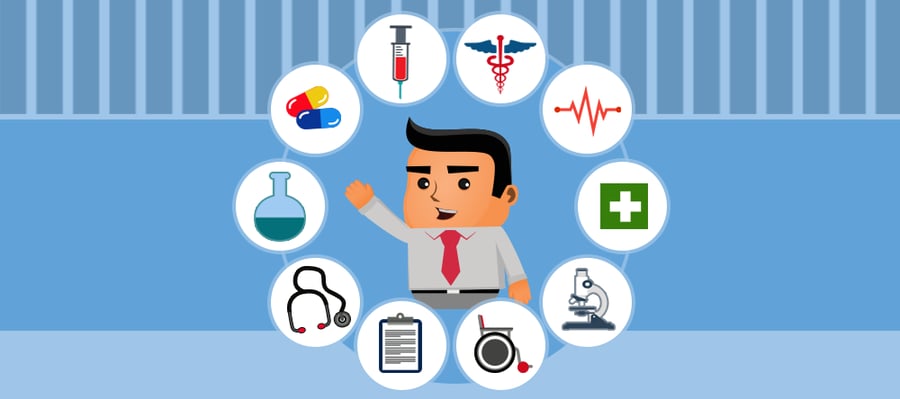Healthcare is one of the world's largest and fastest growing industries. Frequent legislative and regulatory changes, successive technology developments, and consumer behaviors linked to these factors are some of the primary drivers of the rapid evolution of the healthcare market, setting it as an incredibly competitive and challenging stage for various companies and stakeholders. Organizations both public and private continuously reform and modernize healthcare products and systems to improve the delivery of care to growing, diverse populations.
What is Healthcare Market Research?
In order to be successful in providing effective health care to the population, companies utilize healthcare market research to get a better understanding of the perceptions, motivations, and needs of patients, health professionals, and other verticals in the health industry.
To be able to properly conduct effective healthcare market research, one must first understand the different areas in healthcare, the research participants or audiences involved, as well as the methodologies, tools, and challenges involved in the process. In this in-depth guide we uncover what healthcare market research is by discussing these vital aspects. Read along or jump to the specific section you’re interested in:
- Healthcare Market Research Areas
- Healthcare Market Research Audiences
- Healthcare Market Research Methods and Tools
- Challenges of Conducting Healthcare Market Research
Healthcare Market Research Areas

Be it domestic or international, healthcare market research is needed so that service and product providers can make focused and actionable decisions when delving in the healthcare space. While consumption or purchase of health services or products is often not optional, it still doesn’t mean that consumers will indiscriminately buy anything being offered for sale in the healthcare space. To get a better grasp of the pulse of this highly dynamic market, researchers need to focus on the specific market segments or areas that involve their target audiences. Healthcare market research includes the exploration of:
Pharmaceutical Market Research
This type of research covers the stakes involved for drug manufacturing companies, prescription and over-the-counter medications, communications, and channels of pharmaceutical distribution.
- Pharmaceutical companies
- Pharmaceutical distributors
- Pharmacies
Medical Market Research
On the other hand, medical market research explores care delivery in clinics and hospitals, medical procedures, patient relationships, as well as medical equipment acquisition and use in health care institutions.
- Primary and secondary care facilities (hospitals, long-term care, hospices, etc.)
- Healthcare providers (doctors, nurses, specialists, etc.)
- Medical devices and biotech equipment; medical technology firms (surgery equipment, implants, medical imaging, diagnostic and laboratory equipment, etc.)
Health Information Providers and Health Systems Market Research
Individual and group markets, HMOs, employee benefits processes, public health, and all other access-to-care issues
- Health insurance providers and brokers
- Group health practices
- Government health departments & legislation
Healthcare Market Audiences

When it comes to healthcare market research, accurate, reliable results can only come from engaging with the right target audiences. One important step is to identify the people who play the most crucial roles in your specific healthcare landscape. With the target audience in mind, you can create better communication strategies and materials for conducting research and ultimately deliver the best designed products and services. Healthcare market research audiences include:
- Primary care practitioners (general practitioners, specialists, nurses, pharmacists)
- Secondary care practitioners (consultants, caregivers, psychiatrists, clinical psychologists, occupational therapists, dental specialists, physiotherapists, other allied health professionals such as speech therapists and dietitians)
- Healthcare administrators (hospital administrators, healthcare board members, pharmaceutical advisers, managed care organizations, healthcare purchasers, employee benefits brokers and decision makers, government healthcare officials and administrators, public health specialists)
- Patients and other healthcare consumers (disease or condition-specific patients, payers)
Once you have identified the people involved, another vital step in planning healthcare market research is finalizing some aspects that would determine the direction, implementation, and method of your research, by addressing these questions:
- What is the nature, size, and scale of the market you’re going to explore?
- Are your respondents going to include both consumers and providers?
- What are the segments and trends of your target market?
- What are the profiles of the major competitors?
- Who is involved in the processes and decision-making in the purchase of the product or service?
- What is the perception of the business/brand?
- What are the primary factors or influences on the buying behavior of that market?
- Are your existing messaging strategies effective?
Healthcare Market Research Methods and Tools

The next step is to determine the methods and tools that you’re going to use. Decide whether quantitative, qualitative or both are needed for your research, and then figure out the right approach for analyzing the gathered data. Of course, the methods and tools should be determined in consideration of your organization’s or the client’s goals and resources.
Here are some of the methodologies used in conducting Healthcare Market Research:
- Market assessment
The assessment of the target area and both the opportunities and competitive landscape of health products and services within that market environment.
- Segmentation
The evaluation of the market and careful targeting of consumer segments where the product or service would be most relevant.
- New product development
The development and testing process of the labelling, packaging, and other relevant concepts based on the behavior, needs, and other influencers of the target market.
- Brand and image awareness evaluation
The evaluation of the market’s understanding of your brand and its attributes that make or break the success of a healthcare product or service.
- Service evaluation
The monitoring and evaluation of care delivery to determine strengths or shortcomings of a care delivery service for improvement.
- Satisfaction studies
Gauging the level of satisfaction of every stakeholder regarding a process, product, or service in healthcare for development or improvement.
- Needs and value assessments
The assessment of the needs and values of healthcare consumers in order to create appropriate products or targeted services and reduce unnecessary expense.
- Communication
The assessment of the effectiveness of healthcare communication campaigns through various means in order to improve brand development. This evaluation helps in creating more efficient campaigns in the future.
- Channel evaluation
The evaluation of the distribution and channeling of drugs, healthcare products, or medical equipment. Channel evaluation also includes determining whether services are processed or implemented using the right and most relevant approach for end users.
With these methods in mind, here are key market research tools for healthcare for setting your studies in motion:
Online/telephone IDI and focus group platforms
In-depth interviews (IDIs),also known as one-on-one interviews, are widely used in healthcare market research. The one-on-one nature of IDIs provides a great format for tackling sensitive or intimate topics with healthcare market research respondents. On the other hand, while a focus group setting is less private, it is extremely useful for healthcare product or process development and evaluation. Focus group respondents are able to brainstorm and converse with fellow respondents that lead to ideation and valuable insight.
Online community platform and collaboration tools
The participation of respondents in an online community platform for healthcare market research provides the researcher reliable insight to draw from. In using a community research platform for online healthcare market research, respondents can share their therapy experiences, prescription habits, or their overall patient journeys through audio diaries and other engaging activities with other participants.
Mobile research tools for mobile ethnography, mobile surveys, mystery shopping
The ubiquity and ease of use of mobile devices provide researchers a great tool to get actionable in-the-moment insights in healthcare. Researchers can conduct mobile ethnography, mobile surveys, mystery shopping, and even device design and usability testing research for healthcare using mobile.
Challenges in Healthcare Market Research

1. It can be difficult to recruit respondents for a Healthcare Market Research study.
Delving into healthcare market research is no easy feat. For one, the respondents involved in healthcare market research studies aren’t just patients - general practitioners, specialists, hospital administrators, and even managed care stakeholders can all be respondents in one way or another. After all, healthcare is a basic, universal need. Because of this, recruiting respondents for healthcare market research may be more challenging in aspect. For healthcare professionals and paraprofessionals, time is a precious commodity and these persons may not be open to lengthy interviews that may intrude into their day to day practice. Additionally, there may be patients who might not be willing to talk about sensitive health concerns or difficult health conditions.
2. This type of research requires strict adherence to healthcare data protection standards
Another aspect to be considered is the strict adherence to healthcare data protection standards. In the United States, the Health Insurance Portability and Accountability Act or HIPAA is a legislation that provides data privacy and security provisions for safeguarding medical information. Ever since the rise of clinical applications such as electronic recordkeeping and computerized systems for diagnostics in healthcare, claims and care management has become more mobile and efficient. However, as adoption of these technologies continue to increase, they also pose potential security risks in terms of individuals' data protection. With HIPAA compliance in place, healthcare agencies and institutions can minimize security risks as they adopt developments in technology.
3. Delving into the healthcare space demands good pharmacovigilance and hard compliance to ethical guidelines
Last but not least, market researchers also have to keep in mind good pharmacovigilance practices such as the responsibility of adverse event reporting as well as their compliance to ethical research guidelines in conducting healthcare market research.
These ethical guidelines can vary depending on the association or organization a market research firm or market researcher is part of, but they essentially demand the same - that respect, integrity, and professionalism be employed in every aspect of the research process (and not just in the healthcare space).
If you’re a market researcher interested in the healthcare field, everything we’ve covered will be extremely helpful in getting you started. Just keep in mind the areas, audiences, tools and methodologies that you can leverage in understanding healthcare consumers and stakeholders and you’re all set to begin.



